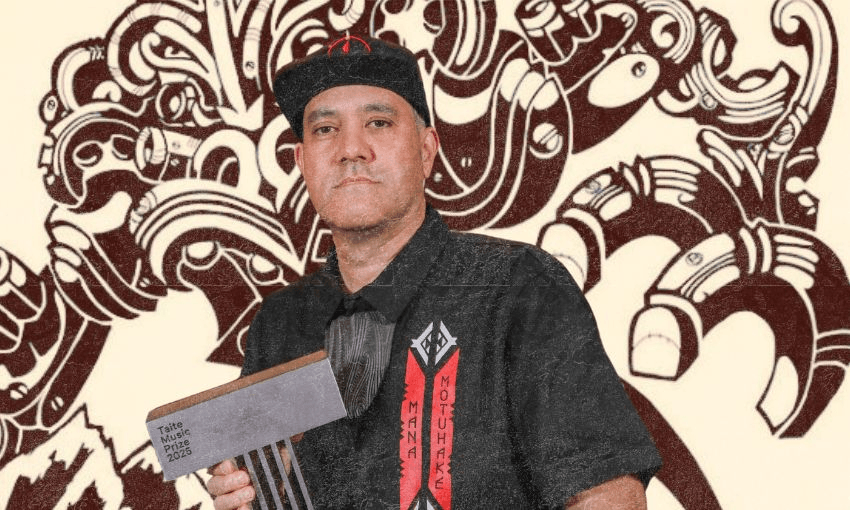The day after winning the Taite Music Prize, Tiopira McDowell aka Mokotron tells Lyric Waiwiri-Smith about his dreams of turning his ‘meth lab’ looking garage into a studio, and why he might dedicate his next record to the leader of the Act Party.
A music awards ceremony one day, a hui to kōrero iwi politics the next: this is the life of newly minted Taite Music Prize winner Tiopira McDowell (Ngāti Hine), known better by his stage name, Mokotron. His electronica, Māori Bass-led album Waerea picked up the ceremony’s main prize on Tuesday night, and by Wednesday morning, he was back to his other life as a university lecturer – rocking up to the office in Jordans and camo to keep a bit of street cred.
Speaking to The Spinoff from the University of Auckland, where he works as a senior lecturer in Māori and Pacific studies and co-head of Te Wānanga o Waipapa, Dr McDowell is between media interviews and meetings, but without having to nurse a post-ceremony hangover. “I’m coming from west-side, so I was like ‘there’s enough stereotypes about Māori,’” he laughs. “I can’t win an award for Māori and show up half-cut. It’s cool for the Pākehā artists, but for us … yeah, nah.”
Waerea is an extension of the sound pioneered by the likes of Moana and The Moa Hunters and Yothu Yindi in the 1980s, the blending of House and taonga puoro to create a body of bass-heavy music which also acts as a vehicle for indigenous politics. Across seven tracks, McDowell raps protests (“who the fuck are you, to trample over the descendents of the land?” on ‘Ko Wai Koe?’, or “my language is the medicine, you are the sickness” on ‘Reo Tōtahi’) over breakbeats and growling frequencies, its grit informed by a central Auckland upbringing. It’s an album that could have only been made in Aotearoa – making it the perfect Taite recipient.
It was also a solo project for McDowell, who wrote and composed the record alone, and tried to avoid the advice of anyone who might have had an idea on how Waerea should have sounded. “When I first started [making Waerea] everyone was like, ‘this is cool, man. Listen to the new L.A.B and Katchafire – if you can make it like that, you’d be mashing up in all the parties across South and West Auckland.’”
“It’s dangerous: the minute you start engaging with others and being part of a set of people, you lose your originality,” McDowell says. “I’m the same with puoro: I don’t hang out with puoro players, I don’t like using normal puoro, I don’t like playing them properly … My puoro look like pieces of trash, and that’s the point. If you use the same puoro, you sound like everybody else.”
McDowell himself is also not like anyone else – as well as having his hands in the musical kete, he has had a storied career as an academic and expert in te ao Māori, once working in the Treaty settlements office as a Crown negotiator. But, no, the some-600 students who listen to McDowell’s lecturers on Māori history aren’t necessarily all Mokotron superfans, though he says the kaupapa and tikanga underpinned in his songs reflects the same messaging he shares as a lecturer.
“It’s a really culturally specific thing … Our people aren’t into underground bass music – they’re into kapa haka and reggae and pop,” McDowell says. “As Māori, we don’t support this kind of music … Diaz Grimm had one of the baddest Māori tunes last year, and I didn’t hear it on anyone’s playlist.
“There is a body of Māori electronic music out there, and Māori DJs aren’t supporting it. I have to go to my Pasifika community for the real hardcore support … So, can it have a future? I don’t know.”
McDowell was surprised to see Waerea receive its flowers at all, especially this early in the game – the record was only released in December. He thinks of Denver McCarthy, who in 2023 received the Taite’s Classic Record award for his 1998 album inside a quiet mind (released under the stage name micronism), and the time it can take between making art, and having others recognise its impact.
“At the time, we knew it was a classic album,” McDowell says. “[Last night] I felt kind of sad, and really happy and really lucky that, man, people wait 25 years for recognition, and I waited four months.”
But that doesn’t mean McDowell is willing to give up on the Māori Bass movement – in fact, he’s been in the studio with indigenous Australian artist Lady Shaka, and has so-far penned three “pretty political” songs for an upcoming project. It was during an interview with the BBC that McDowell realised that “if me and Shaka don’t write these tunes, it’s finished – no one is following through”. Luckily (depending on how you look at it), there’s plenty of material to inspire a Waerea follow up, especially in light of the end of the Treaty principles bill.
“I almost feel like I’m going to have to dedicate [the next album] to David Seymour,” McDowell says. “He’s done so much in terms of unifying the left, and look at the unity in parliament when they cancelled that bill.”
McDowell says he watched the second reading of the bill over livestream on Thursday, “bawled [his] eyes out” and reflected on the 2004 foreshore and seabed protests. “We had a massive tidal wave of grassroots support, but we didn’t kill the bill, and we still haven’t killed the bill,” he says. “I just cried to think my daughters didn’t have to carry that – they killed the bill.”
In that hīkoi over the harbour bridge, McDowell remembers Hone Harawira thanking every Pākehā that had come along – there were so few of them, it was so easy. Now, the Toitū te Tiriti movement has managed to unite thousands across all kinds of ethnic backgrounds in the fight to uphold indigenous rights. “Our people are moving forward,” he says. “We have support that I haven’t seen in my lifetime, and it’s beautiful.”
Now that Waerea has fetched a Taite – the “credibility award”, in McDowell’s eyes – he also picks up the $12,500 cash prize that goes along with winning the main award. McDowell has ambitions to do-up his garage-turned-studio: at the moment, the shoddy little shack looks more like a “meth lab” than a studio, he reckons, which isn’t exactly out of place in his Henderson neighbourhood out in Auckland’s west side, but it doesn’t exactly feel very welcoming, either.
“I’ve never had a studio, and right now I’m in a wet, cold garage with rats and cockroaches, it smells like sewage, and the local cats all spray it,” he says. “I’m working with a lot of Māori artists, and for us to have an actual studio space which anyone could use would be pretty amazing.”
However, he says he is scared of the “psychological impact” he’ll feel from upgrading from a dingy meth lab to a recording studio. “I’ve only ever written music in bad places … Can you make rugged music in a clean space? I don’t know,” McDowell says. “Do you really believe in what you’re doing? Then put three jackets on and get in the garage.”
“I’m already selling out, sis,” he laughs. “I’m undermining my underground credentials. Next there’ll be a fucking window or some bullshit like that.”
Disclaimer: The author of this piece was involved in judging the Taite Music Prize main award.


